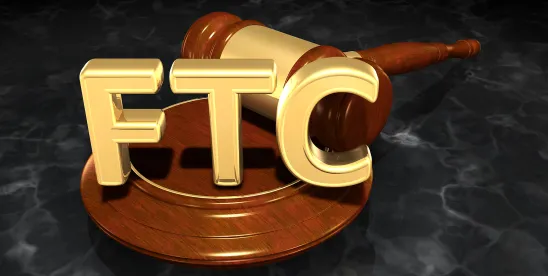On August 6, the Federal Trade Commission (FTC) challenged Edwards Lifesciences Corp.'s proposed $945 million acquisition of JenaValve Technology, Inc. The deal would combine the two leading companies competing to develop transcatheter aortic valve replacement (TAVR) devices to treat aortic regurgitation (AR), a serious and often fatal heart condition. In August 2024, Edwards acquired JC Medical, Inc., whose J-Valve device is currently undergoing a pivotal clinical trial. At virtually the same time, Edwards entered into another agreement to acquire JenaValve, which has already published the results of a pivotal trial for its Trilogy TAVR device and is awaiting FDA approval. The FTC sued to block the second acquisition, which would bring the Trilogy and J-Valve under common ownership. Daniel Guarnera, Director of the FTC's Bureau of Competition, called the transactions "Edwards' attempt to buy the U.S. market for TAVR-AR devices."
The fact pattern stands out in that no TAVR device is currently FDA approved for the treatment of AR, meaning there have been no commercial sales in this market to date. The FTC's complaint does not describe the TAVR-AR device market as a future market, but rather a market that already exists and is currently in its "clinical trial stage." The complaint appears to provide the merging parties' combined market share at the clinical trial stage, although the specific figure is redacted. The figure can probably be inferred from the complaint's allegation that the merging parties are the only two firms with active US clinical trials underway. The complaint also projects that the Trilogy will initially enjoy 100 percent of commercial sales in the relevant market and will subsequently split commercial sales with the J-Valve.
Head-to-Head Competition
Notwithstanding these structural allegations, the FTC did not allege that the acquisition is presumptively illegal under the Merger Guidelines and controlling case law. (The complaint stops short of calculating Herfindahl-Hirschman Index (HHI) market concentration values for the clinical trial stage of the relevant market or projecting future HHIs for the commercial market.) Instead, the FTC's strategy for the complaint’s sole count, under Section 7 of the Clayton Act (15 U.S.C. § 18), is to lean heavily into allegations that the merger would "eliminat[e] vigorous head-to-head competition between Edwards/JC Medical and JenaValve." Although many of these allegations are redacted, the complaint appears to provide an account of executives responding to the competitive pressure between the companies. It also alleges that the companies compete for clinical trial sites and principal investigators and work to improve their respective devices to generate superior clinical outcomes. Based on this evidence, the FTC maintains that "[t]he current head-to-head competition between Edwards/JC Medical and JenaValve drives the companies to accelerate the advancement and improvement of their TAVR-AR devices."
The antitrust agencies routinely present evidence of head-to-head competition between firms — which would necessarily be lost if they merged — to augment a core case built on a structural presumption. However, as Guideline 2 of the 2023 Merger Guidelines explains, "an analysis of the existing competition between the merging firms can demonstrate that a merger threatens competitive harm independent from an analysis of market shares" (emphasis added). Here, it will be interesting to see how the court views a case built largely, and perhaps entirely, on qualitative evidence of on-the-ground competitive interactions to show that the effect of the transaction "may be substantially to lessen competition, or tend to create a monopoly" in violation of the Clayton Act.
The case could also be atypical regarding the parties' defense strategy. In cases involving pipeline pharmaceuticals or medical devices, the question of whether a product at issue will obtain FDA approval and reach the commercial market is typically front and center. Considering that both products are well into clinical studies, the likelihood that the J-Valve will complete its pivotal trial and that both the J-Valve and Trilogy will obtain FDA approval and achieve commercial sales might not be disputed. Edwards issued a brief statement that suggests the company's defense will center around efficiencies and benefits it claims the combination will yield: "Edwards disagrees with FTC's decision and believes it will limit the availability of an important treatment option for patients suffering from aortic regurgitation (AR). The company further believes the acquisition of JenaValve will accelerate the availability, adoption and continued innovation of a life-saving treatment for patients suffering from AR."
FTC's Precedent and Strategic Approach
Back in 2013, the FTC entered into a consent decree to resolve concerns about a merger that, like Edwards/JenaValve, involved two potential entrants into a market with no current commercial participants. Concerning Nielsen's acquisition of Arbitron, the agency alleged that each party had been developing its own national syndicated cross-platform audience measurement service. The Commission analyzed the transaction through the lens of potential competition, focusing on how well-positioned the parties were to enter the market and the time and resources each had already invested. The Commission's Democratic majority concluded that both merging firms met the standard to be considered "actual potential entrants," meaning they were likely to enter. The Commission required the divestiture of assets related to Arbitron’s cross-platform audience measurement service, including audience data and related technology, software, and intellectual property. The Commission vote to approve that consent order was 2-1-1, with one Republican Commissioner dissenting and the other Republican Commissioner recused.
In contrast, the current all-Republican Commission led by Chairman Andrew Ferguson voted 3-0 to sue to block Edwards’ proposed acquisition of JenaValve. This unanimous Commission action confirms several antitrust enforcement priorities under the Trump administration. First, the agencies are willing to test tactics such as building a case primarily on evidence of head-to-head competition. Second, pipeline competition and innovation are paramount concerns. Third, enforcers remain focused on competition in the health care space.




 />i
/>i

